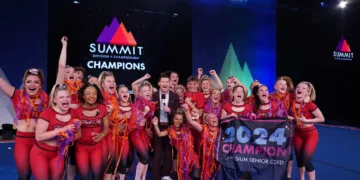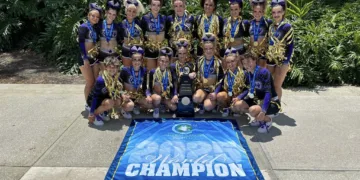Cheerleading, a sport that celebrates dedication, athleticism, and team spirit, has long been a vital part of school culture and competitive athletics. In recent years, however, we are seeing a growing controversy: the debate over which end-of-season event or championship should be considered the most prestigious.
Although this argument may initially seem off-putting, it holds significant implications for athletes, coaches, and the entire sport. In this opinion piece, I argue against the notion that one championship or end-of-season event should reign supreme. Instead, we should all advocate for recognizing and valuing the hard work and dedication that all cheerleaders put into their sport, regardless of which event they choose to attend.
To understand the controversy, it is essential to recognize the landscape of competitive cheerleading. Over the years, several end-of-season events and championships have emerged, each offering unique opportunities for cheerleaders to showcase their talents.
Varsity’s Summits, The Cheerleading Worlds, and the Allstar World Championship are a few notable examples, each providing a platform for athletes to shine. These events, along with others, have become prestigious in their own right, attracting top-tier teams from across the globe.
However, the growing emphasis on one championship being more prestigious than the other has fostered an unhealthy bias within the cheerleading community. This mindset detracts from the core values of the sport, which include teamwork, perseverance, and a love for cheerleading. By focusing on one championship as the pinnacle of success, we risk undermining the achievements of athletes who may choose to participate in other events, thereby diminishing their hard work and dedication.
One of the most compelling reasons to reject the idea of a singularly prestigious championship is the impact it has on young athletes. Cheerleading, like any sport, requires immense dedication and countless hours of practice. The athletes who participate in these events are passionate about their craft and work tirelessly to improve their skills. It is unfair to diminish their efforts simply because they choose a different end-of-season event. All cheerleaders deserve recognition for their dedication, regardless of which event they attend.
Furthermore, emphasizing one championship over others creates unnecessary divisions within the cheerleading community. Rather than fostering a sense of unity and camaraderie, this mindset pits athletes and teams against each other in a way to diminish the other. Cheerleading should be a celebration of shared passion and achievement, not a battleground for determining which event is superior. By valuing all end-of-season events equally, we can foster a more inclusive and supportive environment for all athletes.
The notion of a singularly prestigious championship also ignores the diverse goals and motivations of cheerleading teams. Different teams have different priorities, and their choice of end-of-season event often reflects these priorities. Some teams may value the opportunity to compete on a global stage, while others may prioritize the chance to bond and celebrate their season together. By recognizing the unique needs and goals of each team, we can appreciate the value of all end-of-season events and avoid the pitfalls of a one-size-fits-all approach.
Additionally, the emphasis on one championship being more prestigious overlooks the broader benefits of cheerleading. The sport provides invaluable opportunities for personal growth, teamwork, and physical fitness. These benefits extend beyond the boundaries of any one event or championship and should be celebrated in their own right. By focusing on the positive aspects of cheerleading, we can shift the narrative away from harmful comparisons and toward a more constructive and inclusive dialogue.
All cheerleaders work tirelessly to achieve their goals, and their hard work and dedication deserve recognition, regardless of which event they choose to attend. By valuing all end-of-season events equally, we can foster a more inclusive and supportive cheerleading community that celebrates the sport’s core values. The future of cheerleading depends on our ability to recognize and appreciate the diverse goals and achievements of all athletes, rather than fixating on a singular definition of success.

















